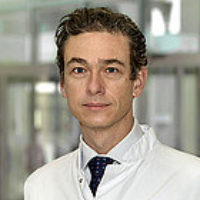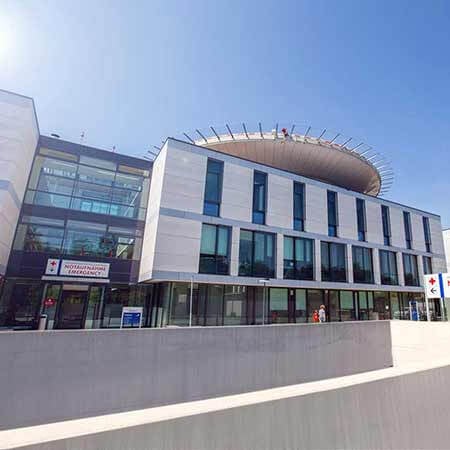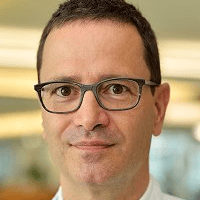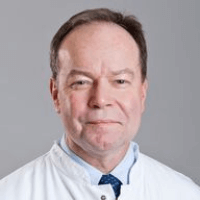Surgical treatment of Brain Astrocytoma in Germany
Treatment prices are regulated by national law of the corresponding countries, but can also include additional hospital coefficients. In order to receive the individual cost calculation, please send us the request and medical records.

Department of Adult and Pediatric Neurosurgery, Spinal Surgery
The Department of Adult and Pediatric Neurosurgery, Spinal Surgery offers all the possibilities of modern surgical treatment for diseases of the central and peripheral nervous system in patients of all ages. More than 6,000 surgical procedures are performed annually in the department's high-tech operating rooms. Both planned and emergency neurosurgical procedures are performed here. The department's surgical team focuses on patients with cerebrovascular diseases, brain and skull base tumors, spine and spinal cord diseases, cerebrospinal fluid circulation disorders, and pathologies of the peripheral nervous system. The department's team of physicians also has extensive experience in functional neurosurgery: specialists perform deep brain stimulation for movement disorders, spinal cord stimulation for back pain, and vagus nerve stimulation for epilepsy. The department works closely with neurologists, radiologists, and nuclear medicine specialists to provide patients with the highest level of comprehensive medical care. The department is recognized as one of the top neurosurgical centers in Germany and beyond, as evidenced by consistently high treatment success rates and numerous quality certifications, including the German Cancer Society (DKG) Certificate, the German Spine Society (DWG) Certificate, and the Leading Medicine Guide Certificate.







Department of Adult and Pediatric Neurosurgery
The Department of Adult and Pediatric Neurosurgery offers the full range of surgical treatment of diseases of the brain, spine, spinal cord and nerves in adults and children. The department keeps pace with new trends in medicine, as well as contributes significantly to their development. Therefore, the most modern diagnostic and therapeutic methods are available here. An individual approach to each clinical case is crucial to ensure optimal treatment results with the preservation of all neurological functions.


Department of Adult and Pediatric Neurosurgery
According to the Focus magazine, the Department of Adult and Pediatric Neurosurgery ranks among the top German medical facilities specializing in the surgical treatment of brain tumors! The department offers the full range of diagnostics and surgical treatment of diseases of the central and peripheral nervous system. A specially trained team of pediatric neurosurgeons provides treatment for various neurosurgical pathologies in children. During the treatment, the doctors use state-of-the-art equipment, in particular, imaging-guided neuronavigation, functional imaging (fMRI), intraoperative mapping, intraoperative videoangiography, etc.






Astrocytomas are a group of brain tumors that grow from astroglia cells. There are both benign and malignant neoplasms. Surgery alone may be sufficient to treat 1 or 2 grade astrocytomas if the doctor has managed to remove the brain tumor completely during the operation. For malignant neoplasms, combined treatment is required. It includes surgery and radiation therapy, as well as chemotherapy.
The principles of astrocytoma treatment
Surgery is the main treatment method for any primary brain tumor (with the exception of lymphoma). Usually, in patients with astrocytoma the operation is performed first, and then, if necessary, additional methods of therapy are used.
Less commonly, radiation therapy is the first-line treatment option. This is possible in the following clinical cases:
- The tumor is small and can be destroyed by radiation therapy (radiosurgery and stereotactic radiotherapy are used as a radical method of treatment for neoplasms up to 3.5 cm)
- The tumor is located deep inside the brain tissue, in the hard-to-reach place (its removal will with a high probability lead to the development of severe neurological deficit or even pose a threat to the patient's life)
- The astrocytoma is inoperable (the pathological process has spread significantly at the time of the patient's visit, therefore surgical treatment is not considered)
- The patient has contraindications for surgery, i.e. he has concomitant diseases that make such treatment unsafe
- The patient refuses the operation; in this case the main method of treatment is radiation therapy, regardless of the size of the astrocytoma and the degree of its malignancy
Peculiarities of surgical treatment of astrocytoma
During the surgery, the doctor tries to remove the tumor completely. In this case, it is important not to injure large vessels and nerves, and not to damage functionally important areas of the brain.
Benign astrocytomas usually have distinct boundaries. In most cases they can be removed completely. Malignant astrocytomas grow into the healthy surrounding brain tissue. In German clinics, neuronavigation and fluorescence diagnostics are used to determine their boundaries.
Based on the results of the preoperative examination, the doctor selects the optimal surgical approach. He cuts the skin, performs craniotomy, cuts the dura mater and coagulates the bleeding vessels. The neuronavigation system helps to find the tumor even deep inside the brain and remove it with minimal trauma for healthy tissues.
In German clinics, doctors use fluorescence diagnostics during the malignant astrocytomas treatment. The essence of the method is the use of a special dye, which accumulates selectively in cancer cells. Then, with special lighting, the doctor identifies the abnormal tissue and excises it completely. Fluorescence diagnostics allows:
- Performing more radical removal of the neoplasm
- Doubling the frequency of complete tumor removal
- Reducing the risk of complications development by reducing the volume of excised healthy brain tissue
- Increasing the overall survival rates
In Germany, intraoperative diagnostic methods are used, such as the functional mapping and electrophysiological examinations. They allow identifying functionally important areas of the brain and avoiding their damage during surgery. These techniques are especially important for tumors that are located deep inside the brain.
During the operation, the doctor excises the tumor. If the tumor has low density, the doctor destroys it with ultrasound and sucks it off with an aspirator. The healthcare professional coagulates blood vessels, sutures the dura mater and performs its plastic, if necessary. Then the trepanation hole (skull defect) is closed. For this, doctors use patient’s own tissues or artificial materials. At the final stage of the operation, the scalp is sutured and a bandage is applied.
Within 1-2 days after surgery, CT scan or MRI is performed. These methods of examination make it possible to assess the radicality of the surgical intervention and the severity of cerebral edema, as well as detect possible complications timely.
Additional treatment after surgery
Depending on the radicality of the astrocytoma removal, the degree of its malignancy and the general health state of the patient, the need for additional treatment is determined. Most often, surgery is combined with radiation therapy. Sometimes it is supplemented with chemotherapy.
Brain tumor treatment schemes are as follows:
- After removal of a 1 grade astrocytomas, radiation therapy is usually not required
- After removal of a 2 grade astrocytomas, radiation therapy is required if the doctor has not managed to remove the brain tumor completely
- After removal of a 3 or 4 grade astrocytomas, surgery is always complemented by radiation therapy and chemotherapy
Additional treatments after surgery may have different goals, depending on the type of brain tumor. This can be the prevention of relapse, increasing a patient's life expectancy, increasing the duration of the relapse-free period, etc.
Usually, radiation therapy is performed no earlier than 4-6 weeks after the operation, when the surgical wounds are healed completely. In the exceptional cases, when astrocytoma has a high degree of malignancy and is growing rapidly, radiation therapy can be performed as early as 2 weeks after surgery or even earlier.
Treatment of the recurrent astrocytoma
Both benign and malignant brain tumors can recur. The risk of the disease recurrence differs significantly for different types of astrocytomas. Benign lesions recur rarely if they are removed completely, or the patient underwent radiation therapy after surgery. At the same time, malignant astrocytomas recur sooner or later in most patients.
In order to detect a new brain tumor timely, patients are examined regularly. Usually this is a CT scan or MRI, which is performed every 3-6 months. If the astrocytoma reappears, there are different treatment options. Most often these are:
- Surgery
- Radiation therapy
When the brain tumor is removed again, relapse may occur faster. But still, the operation can give the patient a few more months, and sometimes several years of active life.
Stereotactic radiotherapy or radiosurgery is often the technique of choice for recurrent neoplasms. It allows destroying small tumors safely and comfortably for the patient. The stereotactic radiation therapy provides comparable to surgery disease-free and overall survival.
Why is it better to receive treatment in Germany?
German clinics are equipped with the latest medical technology. Talented neurosurgeons, who use innovative methods of performing operations, work in this country.
Here are several reasons why thousands of patients from all over the world contact clinics in Germany for the treatment of brain tumors.
1. Availability of innovations. In the leading hospitals in Germany, new technologies are developed and quickly introduced into the clinical practice in order to improve the efficiency and safety of brain surgeries. These are modern neuronavigation, fluorescence diagnostics, intraoperative functional studies, etc.
2. Safety of operations. Before the surgery, the patient undergoes MRI, magnetic resonance spectrography or PET, and functional MRI. The doctor receives information about the peculiarities of the tumor location, its proximity to important brain structures, sources of astrocytoma blood supply. While operating on a patient, the neurosurgeon does not damage large vessels and functionally important areas of the brain, which allows achieving a good therapeutic result with a minimal risk of aggravating neurological deficit.
3. Performing radical operations. In Germany, even malignant astrocytomas are removed completely in most patients. Doctors find all parts of the tumor using both neuronavigation equipment and fluorescence diagnostics. After the complete removal of a benign brain tumor, the patient may not receive radiation therapy. This leads to the reduced health risks, as well as time and cost savings. After complete removal of malignant tumors, patient survival and the duration of the relapse-free period are better.
4. The latest equipment. German clinics use the latest neuronavigation systems with frameless stereotaxis, modern neurosurgical tables and instruments, ultrasonic aspirators, operating microscopes, etc.
5. High-precision and safe irradiation. Radiation therapy in Germany is carried out on stereotaxic devices and linear accelerators of the latest generations. They provide precise targeting of beams to the brain tumor from different angles, so healthy tissues receive minimal irradiation dose. Stereotactic radiation therapy in Germany can be performed without using a frame that is screwed onto the patient's skull.
The ratio of quality and cost of treatment in Germany is one of the best in the world. It is more expensive to receive treatment in German clinics than in Turkey or India, but the level of medicine is also higher here. Prices in Germany are lower than in the USA or Japan, with comparable quality of medical services.
Treatment in Germany at affordable prices with Booking Health
Use the Booking Health service to receive information about the main hospitals, doctors and find out the cost of treatment in Germany. All the leading German hospitals in which it is possible to cure an astrocytoma of the brain with the help of surgery are presented on the Booking Health portal.
You may compare the cost of treatment in Germany in different clinics and book a medical program at the best price. Booking Health will arrange a trip abroad for you. Services and benefits of Booking Health include:
- Choosing a clinic that specializes in astrocytoma diagnosis making and surgery, performs operations efficiently and safely
- Direct communication with a neurosurgeon
- Reducing the waiting time for astrocytoma treatment start and making an appointment at a convenient date
- Reducing the cost of treatment in Germany; prices are reduced due to avoiding the additional coefficients for foreign patients
- Control of the cost of medical procedures and return of unspent funds after the completion of treatment of a brain tumor
- Preparation of a medical program without the need to repeat previously performed diagnostic procedures
- Communication with the clinic after astrocytoma treatment completion
- Purchase and sending medical products
- Arranging additional procedures for the diagnosis making or treatment abroad
Booking Health specialists provide high-quality service. We will book a hotel and air tickets for you, organize a transfer from the airport to the hospital and back.

